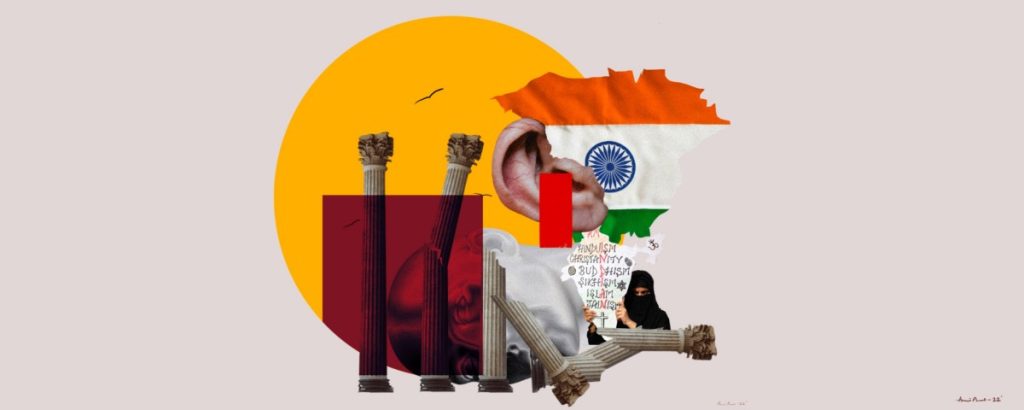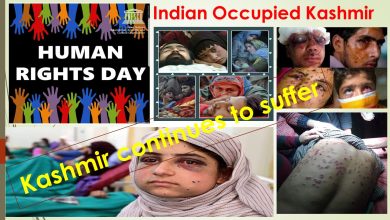Article: Is Indian Democracy a Hoax?
 –Ahmad Ali
–Ahmad Ali
More than 80 countries, representing half of the world’s population, will have elections this year. India is currently continuing its democratic experiment. India’s elections for the parliament began on April 19.
With over a billion eligible voters, India’s elections are widely regarded as the world’s largest democratic exercise – yet they are seriously unsettling. The results, which are expected to confirm Modi’s reign, will be announced on June 4. Narendra Modi, the current prime minister, is running for a third term, making the fabric of the world’s greatest democracy appear in contradiction. Regionalism and identity politics continue to affect electoral outcomes, while coalition politics shape governance dynamics. The election process is longer than ever, spanning six weeks, which substantially advantages Modi’s party, which has extraordinarily well-stocked campaign coffers filled with oligarchs and accused abuses of tax and investigative authorities.
India navigates a difficult political environment, this is a country that has lived through the long-term effects and vestiges of colonialism. Under the facade of development and economic growth, there are deeply entrenched inequities, religious persecution, and astonishingly persistent and pervasive poverty. It is also plagued by an outmoded caste system, gender inequality, and violence against women. Corruption has always been a major hindrance to India’s economic, political, and social development.
How should a country’s overall progress be measured? Should it be based solely on nuclear power, space exploration achievements, or the number of new billionaires produced?
Millions of Indians remain locked in a cycle of poverty, with inadequate access to education, healthcare, and employment possibilities. Furthermore, the prevalence of corruption has a significant impact on India’s economic development, with studies suggesting that it costs the nation billions of dollars each year. According to last year’s World Economic Forum global competitiveness report, corruption is one of the most difficult aspects for conducting business in India, impeding investment, limiting innovation, and distorting market dynamics.
The ruling BJP regime which has been in power since 2014, has exploited these fault lines in Indian society to stir hate but gather popular nationalist and religiously extremist vote. BJP is a political offshoot of RSS, a right-wing Hindu fundamentalist group which not only advocates racial superiority but regards Nazi Germany as an ideal. BJP after coming in power, has started working on RSS’ decades old agenda; religiously cleansing India only for Hindus, rewriting Indian history through textbooks, even changing centauries old names of Indian cities only because of Muslim affiliation and ultimately establishing greater Hindu Rashtra. There has been a great surge in hate crimes against Muslims, other minorities and even lower caste Hindus with entrenching BJP rule over the last decade. According to Hindutva Watch, a USA-based research organization, 255 incidents of advocacy of hatred and violence targeting Muslims were recorded in the first six months of 2023.
The US State Department in its annual report on religious freedom expressed concerns over “open calls for genocide against Muslims, lynching and other hate-fuelled violence, attacks on places of worship and home demolitions, and in some cases impunity and even clemency for those who have engaged in attacks on religious minorities” in India.
The fascist and authoritarian measures have not been limited to religious minorities. After dismantling and crushing India’s secular face through actions like revoking article 370 and 35-A in the disputed Kashmir region, now BJP regime prior to election 2024, has been on a sprint to neutralize any political threat through coercive government force. CM Dehli Arvind Kejriwal was arrested just days before elections without any conviction or money trail while media was forced to stop covering the news of biggest Electoral bond scam which was linked to the ruling party. Moreover, top opposition party Congress accused that its bank accounts were frozen to sabotage its election campaign and income tax department issued Congress a fine of 17 billion rupees in a years old case. On the other hand, newspapers have refused to publish paid advertisements of opposition parties. According to the news agency Mint, opposition candidates are threatened through ED and IT to withdraw their nominations. In one such incident The Guardian wrote “Mukesh Dalal, from the ruling Bharatiya Janata party (BJP), won the Gujrat seat by default after every other candidate was either disqualified or dropped out of the race. It was the first time in 73 years that Surat’s candidate was appointed, not elected.”
Modi’s victory in these elections might mean the end of a pluralistic India, which the West has hailed as an ally against China. The question arises that can the West and the whole world afford to have a nation of a billion people and nuclear weapons led by a supremacist, hyper-nationalist and fascist right-wing regime in a volatile region like South Asia? There has been a time tested phenomenon that regimes and groups living upon hatred, violence and dividing people are like the proverbial Frankenstein monster; they invariably outgrow their creators and sympathizers, often turning on them. Indian extra-territorial assassinations in Canada and US are a few such incidents and a possible glimpse of the future to come.
–Ahmad Ali is a research fellow at Epis Think-tank Germany and an intern at Kashmir institute of International relations. His fields of studies include Foreign Policy, Peacebuilding and Conflict Resolution. He can be reached at Ali7664556@gmail.com








